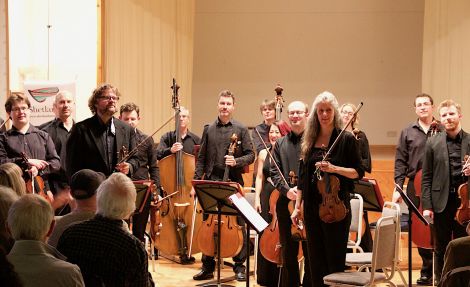Reviews / Review: SCO delivers vivid musical firework
THE Scottish Chamber Orchestra has been visiting Shetland intermittently for about 30 years: touring Scotland is one of its prime functions, and this year the deployment of its 24 strong string ensemble, under the direction of violinist Alexander Janiczek, has enabled the orchestra to tour Shetland itself – at Aith in the West Mainland, Burravoe in Yell, and at Mareel in Lerwick.
So it was that on a dreich July evening, when the leaden grey of the sky had almost completely enveloped the summer landscape, Aith public hall became the venue for a vivid musical firework display.
The programme began with the spirited and – as ever with this composer – uplifting Concerto in D Minor for two violins, by Johann Sebastian Bach. Benjamin Marquise Gilmore, leader of the orchestra, joined Janiczek for the solo violin performance.
It’s worth remembering that until about a hundred years ago, the only way to hear music close-up was to see it being played. Actually to witness an orchestra in full flow, its diversity and unity, the expressiveness and deftness of the musicians themselves, considerably adds to the whole musical experience.
The fluidity of the two soloists’ “conversation”, especially in Bach’s middle Largo movement, was a joy to behold. Is “celestial” too fancy a word to describe such mathematically precise yet delightful music?
Interestingly, the SCO programme notes describe the “infectious playfulness” of this concerto as: “if anything, more appealing to the players than to the listeners.” I think the audience – numbering about 60, filling the hall to capacity – may in this case have begged to differ.
A Divertimento has, coincidentally, been defined as a piece that should entertain both players and listeners equally, and Béla Bartόk’s modern interpretation, the second work in the programme, certainly did so, engendering at its end rousing applause, and sheer delight on the faces of the musicians. It is an astonishing creation, full of surprises and contrasts, changing tempo, at times furiously paced, with elements of Hungarian folk dance woven in.
Become a member of Shetland News
Written in (an also astonishing) fifteen days in the summer of 1939, it was Bartόk’s last work to be written before he left Europe for New York, in the face of the nazification of his native Hungary. Although the middle Adagio movement perhaps reflects the composer’s awareness of impending war, the overall theme is buoyant, even light-heartedly mischievous, especially in the pizzicato interval before the finale.
This brilliant performance ended the first part of the concert. Everyone seemed to be positively glowing in its aftermath. After the interval we were treated to a calmer, more soothing mood with Dvořák’s Two Waltzes.
Although the waltz is a Viennese tradition, and Dvořák baulked at the idea of a “Slavonic” dance of that name, there is definitely a non-Viennese feel to the melodies, the second in particular, with its upbeat rhythm. If not Czech, then they were recognizably Dvořákian.
Pyotr Ilyich Tchaikovsky provided the final, four-movement work of the programme in the form of his Serenade for Strings. Though classified as a Late Romantic composer, Tchaikovsky pronounced the opening movement to be his homage to Mozart (himself a composer of serenades), whom he idolised.
Yet it has an indelible romantic quality in its soaring and sweeping melodies and rhythms, with – as it were – a wandering and wondering waltz replacing the comparatively stiff formality of a minuet in the second movement.
This is followed by the poignant Élégie, and the final movement is a two-part “Tema Russo” (Russian Theme), the first slow and muted, while the second repeats the opening theme of the serenade and ends in a majestic and resounding variation of it. Once again the passion and sheer physical and emotional intensity of the orchestra was evident, and was well rewarded by the audience’s prolonged applause.
I confess to wondering, during the interval, why Bartόk’s Divertimento had not been chosen as a concert finale, as it had been so incredibly forceful. (One audience member said she would not have been surprised if all the hall windows had been blown out by it!)
However…prolonged applause brings forth an encore, and nothing could have surpassed the choice of Italian composer Vittorio Monti’s Hungarian gypsy dance, Czardas, for virtuosity and energy. Here Janiczek, who is of Polish and Czech descent, really displayed his formidable talent as a solo violinist, at the same time directing, without the signals of a conductor, the ensemble in perfectly disciplined, yet apparently spontaneous, unity.
But what gave the dazzling, breathtaking conclusion of this pyrotechnical display another, generous, dimension was the knowledge, imparted to us by Janiczek, that the dance had been arranged for strings by a member (and advisor) of the orchestra, viola player Brian Schiele.
I hope I am not being naïve in my admiration of the SCO as a cohesive, democratic, and joyful ensemble, which we should be mightily proud of and welcome back to these shores with all possible haste. Encore!
James Mackenzie
Become a member of Shetland News
Shetland News is asking its many readers to consider paying for membership to get additional features and services: -
- Remove non-local ads;
- Bookmark posts to read later;
- Exclusive curated weekly newsletter;
- Hide membership messages;
- Comments open for discussion.
If you appreciate what we do and feel strongly about impartial local journalism, then please become a member of Shetland News by either making a single payment, or setting up a monthly, quarterly or yearly subscription.





























































